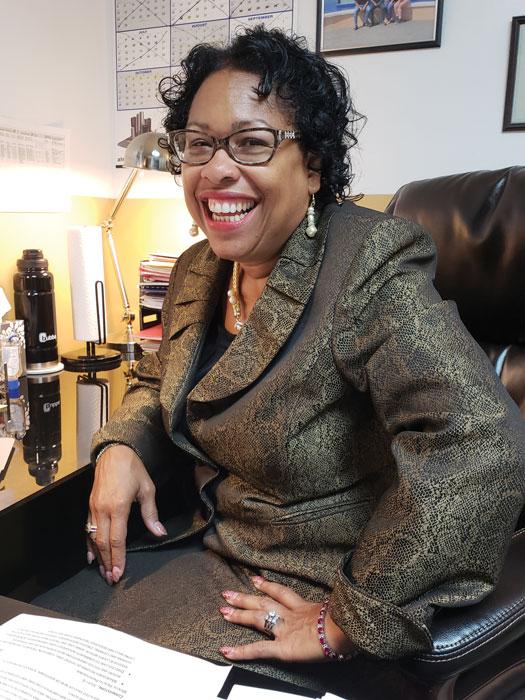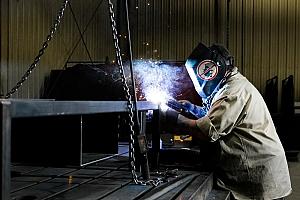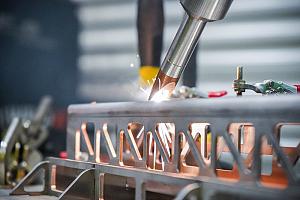- FMA
- The Fabricator
- FABTECH
- Canadian Metalworking
Categories
- Additive Manufacturing
- Aluminum Welding
- Arc Welding
- Assembly and Joining
- Automation and Robotics
- Bending and Forming
- Consumables
- Cutting and Weld Prep
- Electric Vehicles
- En Español
- Finishing
- Hydroforming
- Laser Cutting
- Laser Welding
- Machining
- Manufacturing Software
- Materials Handling
- Metals/Materials
- Oxyfuel Cutting
- Plasma Cutting
- Power Tools
- Punching and Other Holemaking
- Roll Forming
- Safety
- Sawing
- Shearing
- Shop Management
- Testing and Measuring
- Tube and Pipe Fabrication
- Tube and Pipe Production
- Waterjet Cutting
Industry Directory
Webcasts
Podcasts
FAB 40
Advertise
Subscribe
Account Login
Search
Illinois Welding School’s decadelong journey from flailing to thriving
6 questions with Debra Horn, owner/president of Illinois Welding School
- By Amanda Carlson
- January 31, 2019
- Article
- Arc Welding

Debra Horn credits her heart for people as the reason she wanted to take ownership of Illinois Welding School 10 years ago. Despite the steep learning curve and other challenges, the school has grown and thrived under her leadership.
Ten years ago Debra Horn was out of her element and in way over her head. As the new sole owner and president of the challenged Illinois Welding School, Horn realized she had quite a mess to clean up if she intended for the school to remain open and become a viable educational institution serving its community.
Some of the finances were a mess, the school’s two locations were struggling under the weight of seemingly overwhelming debt, enrollment at one location was low, and the reputation at the other location was experiencing some challenges.
Six months in she realized that there were more fires than she knew how to extinguish and as a result felt exceedingly overwhelmed.
She wanted out. Fortunately, Horn wasn’t willing to let herself off the hook that easily.
A lot has happened since that moment. Horn dug in and tackled problems one by one. Through a lot of hard work, prayer, and help from others, Horn and the team at Illinois Welding School have worked their way out of serious financial problems, made changes that have rewritten its reputation among the community and local industry, and are now in a position where students really can come first.
Through it all, Horn was and is unapologetically herself. She’s a woman, she’s African-American—and possibly the only African-American woman who is sole owner of a welding school. No, she’s not some great welder turned business owner, she’s just someone who has taken an active interest in a welding school and the people it serves.
“I’m always going to be black and I’m always going to be a woman. If someone has a problem with that, I can’t make that my problem,” Horn explained.
She’s developed a thick skin, but still remains approachable, kind, and honest—very much like “mom.”
The WELDER® caught up with Horn to find out how in the world she ended up as the owner of a welding school and how this journey has unfolded over the last decade.
TW: Take us through the series of events that led to your purchase of Illinois Welding School.
I was working for people involved in the Workforce Investment Act in Peoria, Ill., in the early 2000s, helping people get involved in different careers. We were interacting with representatives from different trades, and that was when I first became involved with Illinois Welding School. They became one of my clients once I had left the job with the Workforce Investment Act. The school had two locations—one in Bartonville and one in Romeoville—so I would travel to both and conduct job preparedness classes. I wrote a book called Job Search Made Simple, so my classes were geared around the content in the book.
At one point the Romeoville location manager let me know that the owner was getting ready to sell it. I was like, “Oh my God, really?” I’m going to keep it real with you—I’m a Christian, and I started praying. I was concerned for what closing that school would mean for the local population. I had a heart for them, and I still do. I was aware of some turmoil surrounding the school at the time. They had lost their national accreditation, which is bad news, and the Bartonville location was financially carrying the Romeoville location. Romeoville, at the time, had two and a half employees and only three students.I called the owner and he told me that someone else was thinking about buying it. So I said, “OK, how about I call you in a couple of weeks to see how that all works out?” That was March 2008. Well, that buyer never came through, so the owner, his wife, and I started meeting. I met with his CPA and little by little they started introducing me to the company. I signed all the paperwork to take ownership in October of 2008.It’s been a challenge. I believe I might be the only African-American woman who owns a welding school. It’s 100 percent ownership; I don’t have any partners. TW: What were some of the difficulties you had to address when you first took ownership?The bills. I had creditors calling me day and night at both locations. I was seeking to understand how to make the money stretch. I wasn’t aware fully of the debt that existed. At that time the school had a policy to give refunds to students who quit the program. A couple of those students had not received their refund. By the time I took over, those former students were the first business to address.There was also some animosity directed toward me personally after I took over. I wasn’t aware that there’d be so much opposition to me being African-American and a woman.I was naive. I thought I would have everything situated within the first six months, but by the following March (2009) I was sweating bullets and wanting out. Every time I talked myself into walking away, the voice inside my head would say, “What about your staff?” So, I started making all these excuses, like I’d get them letters of recommendation and help them get jobs. And then that voice would come back and say, “What about the students?” That’s when it got real, and I knew no matter how hard things were—and they were hard—that I couldn’t let the students down.TW: What steps did you take to get the school’s finances under control, repair the school’s standing, and learn the nuances of business ownership, particularly as it relates to the welding industry?I enrolled in the Joseph Business School, a nine-month entrepreneurial program through Bill Winston Ministries that teaches how to run a business of that magnitude through all the financial statements, marketing/advertisement/public relations, human resources/hiring/firing employees, leadership, and various other legal aspects of running a business. I have a degree in social studies, psychology, and international studies from Bradley University. My mom had always told me to take business courses, but of course you don’t listen to your mom, right? The Joseph Business School was really a blessing because it allowed me to meet other business owners and get a better understanding of how to run the school. So that calmed me down.We made the difficult decision to close the Bartonville location because it was not operating according to the standards of excellence that we had set out. The Romeoville location’s numbers increased to the point where the tables had turned and now Romeoville was carrying Bartonville. So we closed Bartonville to focus all of our efforts on the Romeoville facility.From there I went through each trouble spot one by one. I talked to students who we owed money to and I called creditors to set up payment plans to start working down our debt. I had several businesses that kindly eliminated some of what we owed them. For example, if we owed $10,000, they dropped it down to $5,500 and let me write off the rest. Other companies let me repay a smaller amount, like $2,000 instead of $3,000. I was very upfront with them and said, “Hey, I’m new, here’s the situation, let’s work this out.” And whatever we worked out, I made sure to keep my word. I think that really helped in re-establishing trust and promoting goodwill.The next step was finding people who had a passion and a desire to train individuals of all experience levels. Our instructors are our bloodline, and we needed to make it a priority to hire good people.After those things were squared away, we did some advertising campaigns, got involved in the community by joining the Chamber of Commerce, and then there was the positive word-of-mouth—that we were here, and we did care. TW: What lessons have you learned over the last decade?Good leaders have good people around them. When you have good people around you, you don’t have to do everything yourself. That’s something I had to learn—you can’t do it all. I empowered my instructors and gave them the freedom to do what they do best, which is teaching our students. Doing that gave me the opportunity to do what I do, which is promote, rally, build, all from behind the scenes. They know I have their backs and that I’m in it with them.TW: How has the school grown or improved since you’ve taken over?We are running two shifts Monday through Friday—first shift is 8 a.m. to 3:30 p.m., and second shift is 4 p.m. to 10 p.m. We have space for 32 students per shift, and right now we have right around 50 students total. It fluctuates.We have certification through the Illinois Board of Higher Education (IBHE) and therefore are able to issue diplomas to our students. In August of 2017, we became nationally accredited through Accrediting Commission of Career Schools and Colleges (ACCSC). We have a program advisory committee that meets twice a year that comprises representatives from various companies and trades from around the area. When I took ownership, Chicago Pipefitters Local 597 wouldn’t even speak to us, but now they are on our program advisory committee, and I’m very proud of that. That just shows you the complete 180-degree turn we’ve done and the positive word-of-mouth that has happened in a short amount of time. Local 1, Boilermakers has always been in our corner and they love it when we call them with new prospective applicants for their programs. Today we have employers looking at and anticipating our students for their positions; it’s amazing.In addition to training students, we provide corporate customized training. We recently hosted Canadian Pacific Railway for training and several other corporations in 2018.We are really proud of the programs we are offering and the successes our students have. We offer three programs—102, which is welding plate in the four processes, SMAW, GMAW, GTAW, and FCAW; 103, which is pipe welding with SMAW and GTAW; and 104, which combines 102 and 103 plate and pipe programs.Our most recent graduation rates show that we had a 94 percent graduation rate in program 102, with an employment rate of 76 percent. To give you an idea, the benchmark for employment is 83 percent for graduation and 70 percent for employment. In program 103 we had a 91 percent graduation rate and an employment rate of 100 percent. For program 104 we had a 97 percent graduation rate and an employment rate of 100 percent. We are so excited about that. Illinois Welding School, 630-679-0566, www.ilws.eduAbout the Author

Amanda Carlson
2135 Point Blvd
Elgin, IL 60123
815-227-8260
Amanda Carlson was named as the editor for The WELDER in January 2017. She is responsible for coordinating and writing or editing all of the magazine’s editorial content. Before joining The WELDER, Amanda was a news editor for two years, coordinating and editing all product and industry news items for several publications and thefabricator.com.
About the Publication
subscribe now

The Welder, formerly known as Practical Welding Today, is a showcase of the real people who make the products we use and work with every day. This magazine has served the welding community in North America well for more than 20 years.
start your free subscription- Stay connected from anywhere

Easily access valuable industry resources now with full access to the digital edition of The Fabricator.

Easily access valuable industry resources now with full access to the digital edition of The Welder.

Easily access valuable industry resources now with full access to the digital edition of The Tube and Pipe Journal.
- Podcasting
- Podcast:
- The Fabricator Podcast
- Published:
- 04/30/2024
- Running Time:
- 53:00
Seth Feldman of Iowa-based Wertzbaugher Services joins The Fabricator Podcast to offer his take as a Gen Zer...
- Trending Articles
Aluminum MIG wires offer smooth feeding, reduced tangling

The role of flux in submerged arc welding performance

Three ESAB welding machines win Red Dot Awards for product design

Power source added to cobot welding system for simplified automation

Connecticut students compete in Maritime Welding Competition

- Industry Events
Pipe and Tube Conference
- May 21 - 22, 2024
- Omaha, NE
World-Class Roll Forming Workshop
- June 5 - 6, 2024
- Louisville, KY
Advanced Laser Application Workshop
- June 25 - 27, 2024
- Novi, MI
Precision Press Brake Certificate Course
- July 31 - August 1, 2024
- Elgin,


























